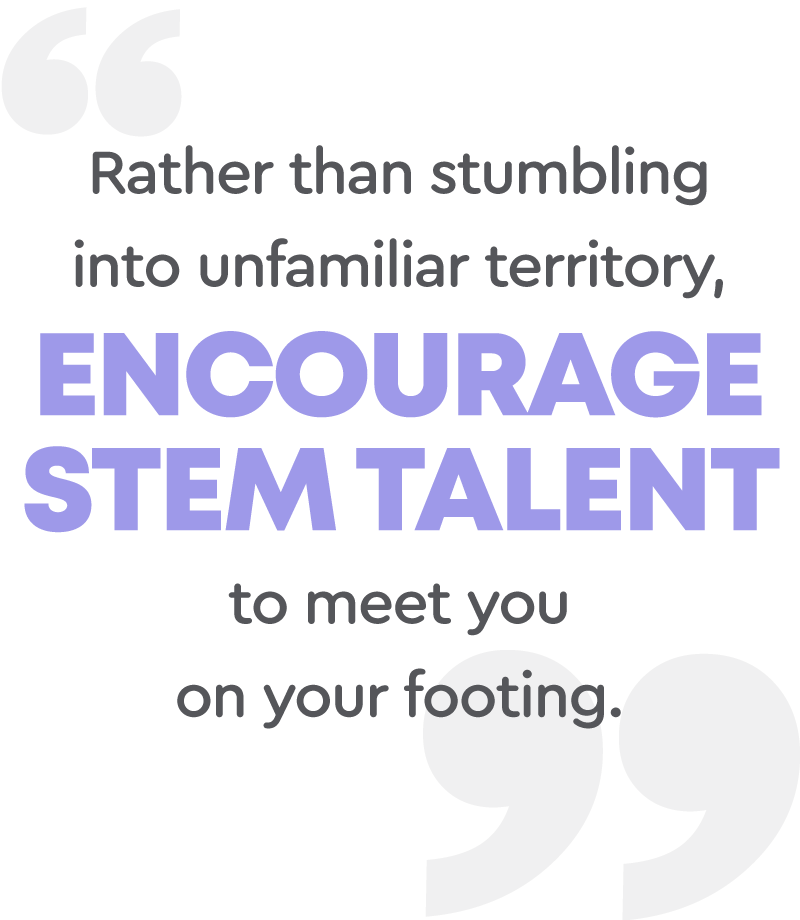4 Questions to Ask Technical Talent (Even When You Don’t Know What You’re Talking About)

Building trust with technical talent, like developers and engineers, can be an uphill battle for everyone involved. In a job market that is seemingly flush with opportunity, great tech talent continues to elude the majority. As a result, all of the emails, InMails, DMs, text messages, and even voice messages that these candidates receive from unskilled headhunters spamming the talent pool encourages most of them to be very selective about their job search partner.
Make the wrong type of gaffe too early in the process or ask overly simplistic questions? Candidates will choose to work with the next recruiter. But show STEM talent that you’re trying and have some semblance of tech-savvy, and you have a good shot at gaining their trust.
Since you don’t have the 10,000 hours to master their specific technical skill set before you start talking, you have to improvise. In fact, by asking the right technical interview questions, you can keep their attention off of your lack of technical knowledge – and learn a little along the way too.
1. What was the last project that excited you?
People love talking about their accomplishments. In fact, researchers at Harvard University even found out that our brains send out pleasure signals when we get to talk about ourselves. When you ask about past projects that have excited candidates, it gives them a chance to discuss something they’re enthusiastic about (and is a quick way to build some rapport). Plus, it provides the illusion that you understand more than you do (or at least keep your tech novice status under the radar a bit longer) by repeating back keywords that candidates mention in your questions and responses.
Pro tip: Ask technical candidates how they like to spend their spare time. Engineers are nearly always tinkering with a side project (or two) that can give you greater insight into what they’re passionate about and how that same fervor could potentially apply to their work with you.
2. What is the most frustrating project or routine task you’ve ever done?
Whether it’s due to constant bugs that need fixing or a feeling stifled by a lack of innovativeness, you shouldn’t be surprised to hear from an engineer that they’re frustrated with a product they’ve worked on.
It’s as important to ground in a position that a candidate doesn’t want as it is to cover one that they do, especially when you’re struggling to keep up with the lingo. To put it simply – just because someone is compatible on paper doesn’t mean a role actually appeals to them.
This question gives the candidate the floor – he or she can talk about their pet peeves and you can learn which roles not to present them. You’ll develop a deeper connection with talent, disqualify incompatible roles together, and learn some technical material along the way.
3. What ROI has your technical expertise had on an organization?
Rather than stumbling into unfamiliar territory, encourage STEM talent to meet you on your footing. While it’s doubtful that a developer or engineer knows any specific revenue figures, they should know (and care) how their work has impacted an organization as it relates to ROI.
By asking tech professionals about their impact, you can gain a better understanding of their perspective, what motivates them, and how those elements tie into the position at hand. Not to mention, this question helps you to clarify more specialized concepts – without tipping your hand to candidates.
4. How would you explain a technical concept to a non-tech person?
Few organizations have STEM professionals sequestered from the layman population. In some capacity, whether it’s to a non-technical client or coworker, they’ll need to simplify tricky concepts. Encouraging them to outline how they’d handle this hypothetical situation can show a few things:
- The candidate has a thorough understanding of their skills and how to apply them.
- The candidate has strong enough communication skills to simplify technical languages and to gauge what word choice works best for differently-minded individuals.
- The general demeanor the candidate shows when put in unique or unexpected situations.
Build Rapport Without Technical Expertise
More than just asking the right technical interview questions, building credibility and relationships with candidates depends on your ability to connect with them. At some point, they were in your boat – trying to learn a new skill set in order to advance their career. Don’t worry about what you do or don’t know; instead, embrace clarifying technical interview questions like these and there’s a strong possibility that you’ll learn more than you bargained for.
About The Author
Kelly Kennedy is the Director of People at interviewstream. She's passionate about learning, culture, and engagement and spends her free time on any body of water within driving distance.
